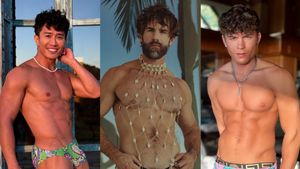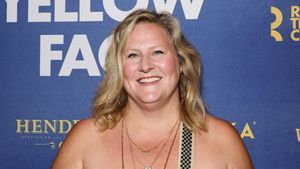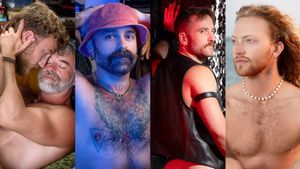
Treatment GuideJust DiagnosedSex & DatingAfrican AmericanStigmaAsk the HIV DocPrEP En EspañolNewsVoicesPrint IssueVideoOut 100
CONTACTCAREER OPPORTUNITIESADVERTISE WITH USPRIVACY POLICYPRIVACY PREFERENCESTERMS OF USELEGAL NOTICE
© 2024 Pride Publishing Inc.
All Rights reserved
All Rights reserved
By continuing to use our site, you agree to our Private Policy and Terms of Use.
Like others who share his cultural and ethnic heritage, Antonio Osuna has witnessed the effects of machismo cripple HIV-positive Latinos in the United States with a fearful silence. Originally from Tijuana, the San Francisco Bay area transplant says, 'The Latino attitude toward HIV is that if we don't talk about AIDS, it does not exist.' Yet there is such an urgent need for dialogue. Statistics released ahead of National Latino AIDS Awareness Day--coming up on October 15--show that Latinos accounted for 19% of U.S. AIDS cases diagnosed in 2005, while they make up only 14% of the U.S. population. While white and black Americans accounted for larger percentages of diagnosed cases for the same period (29% and 50%, respectively), the prevalence of the disease among Latin Americans who live in the United States has increased from 15% in 1985 to 19% in 2005; for white Americans the numbers dropped from 59% in 1985 to 29% in 2005. Exacerbating their HIV troubles, Latinos are less likely than white individuals to have access to quality health care. About one in four U.S. Latino HIVers has no insurance at all, compared to one in six among white HIVers. Because of the drastic effects HIV is having on their peers, friends, and families, Osuna and the four other Latinos profiled here--Pablo Delgado, Quintin E. Perez Jr., Nina Martinez, and Kahlo Benavidez--refuse to stay silent about living with HIV--and not just on National Latino AIDS Awareness Day. Their voices are part of a vital chorus of HIVers across the country who are taking their story public to make a difference in the lives of others infected with the virus as well as to help prevent its spread to others. THE BIG BROTHER Pablo Delgado 23 years old Lives in New York City Diagnosed in 2003 Pablo Delgado is living the classic American dream--with a twist. He's got the classic tale down pat. He showed up in Manhattan 3.5 years ago with $600 and his luggage--and without knowing a soul. He lived in a hostel, peddled coffee, and did the hand-to-mouth thing, looking forward to Wednesdays, when the hostel gave out free pizza. Eventually he landed a job at a fashion showroom. A whiz at sales, he was soon running the showroom. Then he broke away and rented his own space, taking his Rolodex with him. Now he has his own showroom, with seven clients and six employees. Taking a step up, he lives in a high-rise apartment with a view of the Empire State Building. The flip side of Delgado's story is that he came from the very world of privilege he has climbed his way back toward. Growing up in an affluent Miami family, he had all the benefits of private schools and lavish family vacations. Then, what started as a bit of experimentation in college turned into rampant substance abuse and recklessness: 'crystal, X, G, K, cocaine, acid, marijuana, and self-prescribed medication,' in his own words. He dropped out. He became infected with HIV. His parents cut him off financially. 'I had a lot of suffering,' he says. During those times, he thought he was unworthy of the kind of life he lives now. He perceived himself as dirty, seedy, and a raunchy sexual creature. Delgado says his diagnosis at 19 helped him get his act together. Today, he proudly states, he's two years' sober and attends regular 12-step meetings. Raised Catholic, he says the meetings have given him a new, life-affirming sense of his spirituality. 'HIV has definitely helped me--the awareness it gave me,' he reflects. 'It's got me thinking about others, about education and communication. I didn't ever really care about that.' Delgado says he sees it as his duty to be a big brother to anyone who needs to talk about HIV, safer-sex practices, or the perils of substance abuse. He regularly reaches out to his fellow 12-steppers and is writing a memoir that he hopes will send the message to others about the dangerous mix of drugs and youthful abandon. Discouraged by an industry that can be highly superficial, he's planning an upcoming benefit in New York that he says will intertwine fashion with HIV awareness. Recently, he posed for an antidrug ad produced by New York City's Crystal Meth Working Group. Showing off his featherweight build and bearded baby face, he posed shirtless alongside a good friend with 'Stop hurting yourself' emblazoned across their bodies. 'I had to grow up really fast,' Delgado says of the past few whirlwind years. 'I think definitely I have matured. I've found who I am in a very unique way.' THE MENTOR Quintin E. Perez Jr. 42 years old Lives in Lorain, Ohio Diagnosed in 1986 For the first decade or so after his diagnosis, Quintin Perez kept pretty quiet about having HIV. 'Then I just decided I could do something good for somebody else,' says Perez, who lives in suburban Cleveland. Today, he sits on the Lorain County AIDS Task Force, which determines how proceeds of the local AIDS walk are disbursed. He is also on the Ryan White Title I program committee and serves as a mentor for a group of newly diagnosed HIVers. 'The misconception is that they're going to die,' he says of the members of his group, so he begins dispelling HIV's myths by sharing the simplest, most fundamental truths of living with the virus. Retired from the military, Perez, who is an old pro after living with HIV for more than 20 years now, says he's gained as much from mentoring as he hopes he's given to the people under his charge. 'In the first years after I learned I was positive,' he says, 'we didn't have stuff like that, and I felt very alone.' But that's not the only obstacle he's felt challenged by in his years with HIV. Being of Puerto Rican descent, he says he gets frustrated in his efforts to persuade his fellow Latinos to answer the rallying cry and participate in volunteer work for HIV-related causes. 'I feel that in the Latino community things are kept hush-hush--especially being gay or being positive. They feel scared that their family will find out.' Why? 'Pride,' he responds. But for Perez, he finds pride instead in giving back. THE EDUCATOR Nina Martinez 24 years old Lives in Atlanta Diagnosed in 1991 Without pretension, Nina Martinez says, 'I've had a somewhat normal life with HIV.' She projects a matter-of-fact and sharply confident air of someone who is both wise beyond her years and driven to make good on the chances she's been given. And obstacles be damned! Infected through a blood transfusion as a baby, she was diagnosed at the age of 8. She excitedly told all the impressed kids at her New Jersey elementary school that she was related to Magic Johnson, rankling parents and administrators alike. An 'army brat' who lived in 12 different cities, Martinez had her childhood suddenly and prematurely halted. 'For so long, people tell you, 'Oh, you're going to die; you're going to die,' ' she says. 'I don't have that shortsightedness anymore.' After the high school graduation she never expected actually came, she returned to Washington, D.C., the city where she says she'd received the best HIV treatment, to attend college at Georgetown University. And now she is finishing her master's degree in public health at Emory University in Atlanta. Among her academic pursuits, she is working to examine why people choose--or decline--to enroll in HIV vaccine trials. Having served as a research subject for the National Institutes of Health while in college, she hopes to one day join the team and design clinical trials. Martinez recently took time off from school to participate in a speaking tour for Hope's Voice, educating college students about HIV and sharing her story. For this, she says, she had a 'selfish motive' for speaking out: 'For those people who maybe would be newly diagnosed in the future, I wanted to create this acceptance for people with HIV because I didn't have that when I went to college.' But she does prefer to downplay her ethnicity during speaking engagements. 'I see the importance of targeted interventions,' she says, 'but I think they may also create artificial distinctions that the virus just does not recognize. Sure, Latinos are at greater risk. People just don't realize that that's a population term, and it doesn't say what happens to you individually. Your risk is not defined by who you are, Latino or not. It's defined by what you do. I don't want to perpetuate that HIV has a certain look.' THE NURTURER Antonio Osuna 37 years old Lives in Fremont, Calif. Diagnosed in 1999 Last fall an undocumented immigrant from Mexico named Gilberto Mejia lay bedridden in the San Francisco Bay area's Washington Hospital; he was 20 years old and very sick with complications from AIDS. A case worker referred him to Antonio Osuna and his partner, Ron Chavez, who together run a Spanish-speaking support group. Shortly afterward, the hospital attempted to discharge Mejia, since he had no insurance. Osuna and Chavez sprang to action. They called the local Telemundo and Univision TV affiliates, each of which sent crews to film expos's. The hospital's administration quickly changed its tune and allowed Mejia to remain in care, eventually discharging him to a skilled nursing facility. Osuna, who is a native of Tijuana, explains that Spanish-speaking HIVers need an extra helping hand: 'They don't know how to work the system.' Five years ago Osuna and Chavez were lamenting the lack of a Spanish-speaking support group for HIVers in their area. So they took it upon themselves to start one--in their living room. Today, in Osuna's words, the group is 'a family.' Once a month as many as 50 HIVers arrive to hear speeches from doctors, lawyers, or therapists about living with HIV. They come saddled with fears of dying, confusion about government red tape, and constant worries about deportation. But Osuna works to assuage their fears: 'I say, 'We have hope.' ' He also sometimes makes them a big pot of posole, a stew of pork and hominy that is common comfort food in Mexico and other Latin American countries. 'Everybody loves my posole,' he says with pride. Osuna, who says he used to drink excessively, has also found a new sense of purpose and increased self-esteem through volunteer work. And he is getting the word out through a monthly radio program he cohosts on KIQI 1010 AM that addresses HIV among Latinos. 'If you help people, you help yourself,' he says. 'It is the best medication in this world.' THE CAMPAIGNER Kahlo Benavidez 21 years old Lives in Las Cruces, N.M. Diagnosed in 2004 Imagine it: A young man only 18 years old finding out he's HIV-positive. There he was, telling his devastated mother the truth. She became hysterical, cursing in Spanish. But then her mood shifted. She gave her son a big hug, promising him unconditional love and support. Kahlo Benavidez leads a dynamic life, taking on HIV activism and advocacy in addition to his obligations as an undergraduate student with a full-time job at a hotel. He says he has the solid backing of his family to thank for giving him a voice. And he knows he is lucky. 'There's definitely a kind of 'speak no evil, see no evil, hear no evil' mentality in the Latino community,' he says. 'I really think we try to close off from anything that we don't believe or that makes us uncomfortable.' After his diagnosis, Benavidez spent a lot of time pointing fingers. Eventually he was able to take ownership over what had happened to him at such a young age and--with youthful spirit on his side--he made an effort to make something good out of the experience. He decided that the silent path was not one he would take. In 2005 he hopped on the bandwagon. He joined the Campaign to End AIDS caravan, which traveled across the country, stopping for rallies in big cities and small towns alike on its way to a massive lobbying day in Washington, D.C. 'It was nice to meet other people who are my age,' he says of the friends he made on the journey. 'In my community I'm the youngest person I know with HIV. It felt really good to see for the first time that I wasn't alone.' One of those friends was Tom Donohue, executive director of Who's Positive, who got Benavidez hooked up with his organization's Operation: Get Tested tour through the Northeast last year. Benavidez joined a group of young HIVers who traveled to eight different schools to talk to students about their experiences and encourage them to take an HIV antibody test. At home, Benavidez serves on the Governor's HIV and AIDS Policy Commission and the Community Planning and Action Group, which sets HIV prevention policies statewide. He spent 2006 working as a peer educator and HIV prevention specialist at a local AIDS service organization. Once he receives his undergraduate degree in social work from New Mexico State University he plans to get into case management. His next step, he adds, could be a master's degree in counseling and educational psychology. One day, he says, he hopes to open his own counseling practice. For Benavidez, HIV has served not as a roadblock but as a catalyst for further progress. 'My personal philosophy,' he says, 'is that life goes on whether you do or not.'
From our Sponsors
Most Popular
Why activist Raif Derrazi thinks his HIV diagnosis is a gift
September 17 2024 12:00 PM
How fitness coach Tyriek Taylor reclaims his power from HIV with self-commitment
September 19 2024 12:00 PM
Exclusive: We kiki with Q from 'RuPaul's Drag Race'
June 24 2024 11:37 AM
Out100 Honoree Tony Valenzuela thanks queer and trans communities for support in his HIV journey
September 18 2024 12:00 PM
The freedom of disclosure: David Anzuelo's journey through HIV, art, and advocacy
August 02 2024 12:21 PM
Creator and host Karl Schmid fights HIV stigma with knowledge
September 12 2024 12:03 PM
Activist and philanthropist Bruce Bastian dies at 76
June 26 2024 1:28 PM
In honor of Juneteenth 2024, meet The Normal Anomaly
June 19 2024 1:39 PM
Plus: Featured Video
Latest Stories
Ricky Martin delivers showstopping performance for 2024 World AIDS Day
December 05 2024 12:08 PM
AIDS Memorial Quilt displayed at White House for the first time
December 02 2024 1:21 PM
Climate change is disrupting access to HIV treatment
November 25 2024 11:05 AM
California confirms first case of even more deadly mpox strain
November 18 2024 3:02 PM
Post-election blues? Some advice from mental health experts
November 08 2024 12:36 PM
Check out our 2024 year-end issue!
October 28 2024 2:08 PM
Meet our Health Hero of the Year, Armonté Butler
October 21 2024 12:53 PM
AIDS/LifeCycle is ending after more than 30 years
October 17 2024 12:40 PM
Twice-yearly injectable lenacapavir, an HIV-prevention drug, reduces risk by 96%
October 15 2024 5:03 PM
Kentucky bans conversion therapy for youth as Gov. Andy Beshear signs 'monumental' order
September 18 2024 11:13 AM
Study finds use of puberty blockers safe and reversible, countering anti-trans accusations
September 11 2024 1:11 PM
Latinx health tips / Consejos de salud para latinos (in English & en espanol)
September 10 2024 4:29 PM
The Trevor Project receives $5M grant to support LGBTQ+ youth mental health in rural Midwest (exclusive)
September 03 2024 9:30 AM
Introducing 'Health PLUS Wellness': The Latinx Issue!
August 30 2024 3:06 PM
La ciencia detrás de U=U ha estado liberando a las personas con VIH durante años
August 23 2024 2:48 PM
Tratamiento y prevención del VIH por inyección: Todo lo que necesita saber
August 23 2024 2:41 PM
Sr. Gay World quiere asegurarse de que estés bien
August 23 2024 2:30 PM
Eureka is taking a break from competing on 'Drag Race' following 'CVTW' elimination
August 20 2024 12:21 PM
With a new case in Sweden, what is the new mpox outbreak and should you be concerned?
August 15 2024 4:48 PM















































































